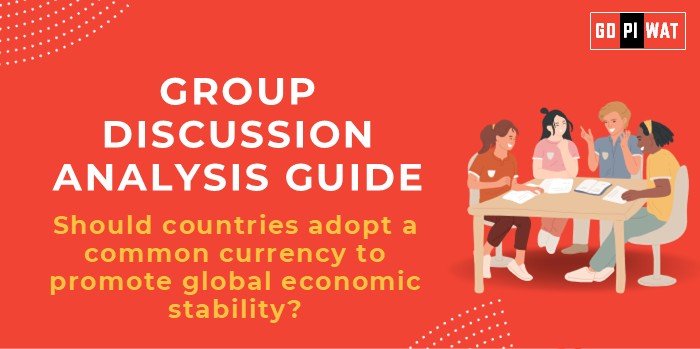📋 Group Discussion (GD) Analysis Guide
🌐 Should Countries Adopt a Common Currency to Promote Global Economic Stability?
📖 Introduction to the Topic
Opening Context: The idea of a common currency has long been debated as a mechanism to facilitate seamless trade, reduce exchange rate volatility, and enhance global economic stability. With the success of the Eurozone, many wonder whether extending this concept globally could mitigate financial crises and foster economic integration.
Topic Background: The adoption of a common currency, inspired by the Euro introduced in 1999, aims to reduce transaction costs and strengthen economic alliances. However, it requires significant alignment in fiscal, monetary, and economic policies.
📊 Quick Facts and Key Statistics
- 💶 Eurozone GDP: €14.5 trillion (2023) – Highlighting the economic scale managed under a common currency.
- 💱 Currency Exchange Costs: Average 3-5% of transaction value – A unified currency could eliminate these costs globally.
- 🌍 Global Trade Value: $32 trillion (2023) – A common currency might facilitate easier trade settlement.
- 📉 Exchange Rate Volatility: Over 10% variation in major currency pairs in 2023 – A common currency could stabilize trade partnerships.
🌟 Stakeholders and Their Roles
- 🌐 International Organizations (e.g., IMF, WTO): Facilitate policy frameworks for adoption and oversight.
- 🏛️ National Governments: Harmonize fiscal policies and monetary sovereignty.
- 🏢 Businesses and Trade Organizations: Potential beneficiaries from reduced transaction costs and stable exchange rates.
- 👥 Citizens: Could face shifts in purchasing power and economic stability.
🏆 Achievements and Challenges
✨ Achievements
- ✅ Eurozone Success: Enabled trade growth, reduced inflation, and stabilized the region.
- 💱 Increased Trade Efficiency: Common currency reduces the need for currency conversion.
- 📈 Simplified Monetary Policy: Easier to implement coordinated policies across participating nations.
⚠️ Challenges
- ⚖️ Economic Sovereignty Loss: Countries lose control over individual monetary policies.
- 📉 Economic Disparities: Rich and poor nations face unequal benefits.
- ⚔️ Crisis Amplification: A shared currency can exacerbate regional crises (e.g., Greece’s debt crisis).
📘 Global Comparisons:
– Success: Eurozone—Unified currency supports seamless trade.
– Challenge: ASEAN—Limited integration due to economic diversity.
– Case Studies:
– Eurozone: Resilience during crises but exposed disparities (e.g., 2008 financial crisis).
– Africa: Regional currency attempts like the West African CFA Franc show limited success due to structural challenges.
💬 Structured Arguments for Discussion
- ✅ Supporting Stance: “A common currency would stabilize global markets and eliminate trade barriers.”
- ❌ Opposing Stance: “Economic sovereignty is vital; a common currency can amplify financial crises.”
- ⚖️ Balanced Perspective: “While beneficial for trade and stability, adopting a common currency requires addressing disparities and establishing robust policies.”
💡 Effective Discussion Approaches
- 🌏 Opening Approaches:
- Start with statistics on Eurozone economic stability.
- Highlight the potential reduction in trade barriers globally.
- Use a case study like Greece to discuss risks.
- 🤔 Counter-Argument Handling:
- “Loss of monetary control can be mitigated with shared fiscal policies, as seen in the Eurozone.”
- “Disparities can be addressed through equitable contribution mechanisms.”
🔍 Strategic Analysis of Strengths and Weaknesses
- 💪 Strengths: Reduced currency volatility; enhanced global trade; streamlined monetary policies.
- ⚖️ Weaknesses: Loss of individual monetary control; high dependency on collective economic health.
- 📈 Opportunities: Strengthened global partnerships; reduced transaction costs.
- ⚠️ Threats: Potential for regional crises spreading globally; resistance due to national interests.
🎓 Connecting with B-School Applications
- 🌍 Real-World Applications: International finance, trade strategies, and global economic policies.
- 💬 Sample Interview Questions:
- “What are the challenges of adopting a global common currency?”
- “How does a common currency impact monetary policy flexibility?”
- 💡 Insights for B-School Students:
- Understanding global economic interdependence and the complexities of policy alignment.


